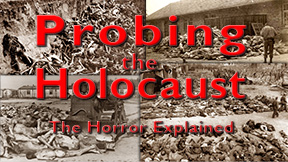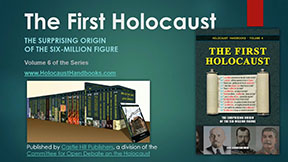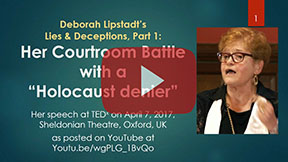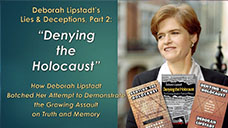This is an essay about my father and me. Some say that, in order to judge a man, you need to know what relationship he has (or had) with his father. I do not entirely agree with that, but I admit freely that my past relationship with my father has something to do with my involvement in revisionism.
1945/46
The nine year old boy prefers spending his spare time playing at the pond over at the quarry. His childhood was not bad so far, though his father is quite violent once in a while, but when he is allowed to go out to his favorite places, his little world is just alright. But this very afternoon, things are different. Russian troops flood the village. The horror of the end of World War II has reached this small boy’s world. But he is fortunate. The Soviet beasts have satisfied their thirst for German blood and lust for German women in the towns and villages further east, and by the time they reach this little village, they are rather civilized. So neither the boy’s 14 year old sister nor his mother are touched, nobody gets hurt. It takes another year for the new Polish authorities replacing the German authorities to decree that all Germans have to leave this Silesian village, a place that was founded by German settlers in the 13th century. The boy and his family, whose ancestors came here from Franconia in the 13th century, have to leave and will never be allowed to come back. The entire 600 year old German province is “ethnically cleansed” from its 6 million inhabitants, as are all other east German provinces. The boy and his family, once proud farmers, resettle in West Germany, but languish as servants in a rat-hole-kind of housing under humiliating conditions. Family life is hell under these circumstances: The father violent against his children and their mother, the mother an unhappy, bitchy shrew. As all German refugees, the boy is treated with contempt by most of his German compatriots, and his school mates regard him as unworthy to associate with. As the boys turns 15, he leaves his parental home to become a gardener and to never look back at the misery he leaves behind.
Change of Scene – 1960-1966
The tall, handsome young landscape gardener is in tremendous pain. He will not know it for another 25 years, but he just had a spine disk slip into his spinal channel. No physician diagnoses it properly, so this major injury that could paralyze him stays untreated. He has to change his career. He decides to become one of those social education workers he adores so much: He wants to learn to deal with other humans in need. So he joins a Catholic college. He does not perform very well there, since he has massive problems to socialize. His past has left scars. But at that college he meets this gorgeous secretary in the office who is so social and vivacious and adores in particular this tall, handsome guy who is going to be what she wanted to be, but was not allowed by her parents: a professional social education worker, helping people in need. They fall in love, but as it is in those years, it is merely a weekend relationship when both young people wear their Sunday smile. They get married, and she starts having children, but quickly realizes that he is not at all what he seemed to be. He is impatient, cannot show any affection, won’t talk about what bothers him, is frustrated by his job because he feels (and is) inapt, is under permanent back pain, and gets violent at times, in particular against his oldest son who is such a stubborn, defiant, strong-willed person. This being her first and only man she will ever date, his wife gets the flawed impression of how men are, and she fears that her oldest son once will be just like him, so she develops a counter strategy.
Change of Scene – 1968
A three year old boy wants it his way, but his father wants it the other way. Who will prevail? The father uses force in an attempt to break the boys will – to no avail. The mother steps in to protect her son from the wrath of the father who sees his authority challenged. As defiant as the boy is, his father develops a bad habit of blaming all misdeeds and mishaps allegedly committed by any kid on him – a broken window, noise during nap time, paint on the wall. The boy in return develops a trait of his even further: an extreme sense of justice, in particular the unwillingness to accept any disadvantage or punishment meted out against him without any justification. When he turns 5, he starts asking his mother questions: Why does my father treat me that way?
“It is not because he does not love you”, she replies. “It is because he was treated even worse when he was a child, and he doesn’t know better.”
Then she tells the little boy the terrible story of how his father, as a little boy, was expelled from his home together with his family, and how life had been a horror for this family ever after. The mother makes her husband sit down with the boy and explain it to him. So one evening before bedtime, he sits down with his son, takes a map of Germany, and shows the boy where he grew up as a boy, and what happened to Germany after that terrible war.
“On the map Germany had the shape of a bear with a rider on its back. After the two last wars, the victorious countries robbed all of these territories and chased away all the Germans living in the eastern area. The Germany lost its head, its front legs, its neck, its tail, and the rider lost his hat. Hertwigswalde is the village where I lived as a boy, and it is located down here in the middle of the front legs of the bear”, his father said, pointing right into to the middle of Silesia, a bit south of the city of Breslau.
This is the only time his father ever mentions this village’s name. His father doesn’t like his past, prefers to forget and suppress. The boy’s mother, on the other hand, tries to prevent that her son becomes as her husband: she spends lots of time with him to teach him how to express his thoughts and emotions properly. When the boy turns 15, his father even gets jealous at him for the deep and close relationship he has to his mother.
Change of Scene – 1983/84
The tall, handsome, young student, who just enrolled at the university to study chemistry, is looking for a place to sleep. He finds out by accident that a catholic student fraternity is renting out cheap rooms. He gladly accepts. It turns out to be a Student fraternity which originally resided in Königsberg, East Prussia, but which had been expelled at the end of WWII. A fateful encounter. In the fraternity’s rooms, the young student finds a rich library with books on German history, with focus on the history of the lost east German territories. The student starts reading, learning, soaking up like a dry sponge information about his own family’s past that had such an impact on his own childhood. Then, just a few months after he had joined this fraternity, another member of it suggest to spend an extended weekend during the upcoming semester break in then still communist Czechoslovakia with friends of his. While making a break in Munich during their journey southeast, they all go to a bookstore focusing on the east German territories. Our young student manages to buy a detailed map of pre-war Silesia, the former east German province where his father stems from. However, the other student suddenly reveals that the purpose of the vacation in Czechia is a different one after all: he is going to smuggle religious and political literature (like George Orwell’s 1984) as well as a table photocopy machine to a Catholic parish in Prague. The young student decides that fighting communism is an adventure worth the risk and joins in. However, they all get caught. While our young student is lucky to just gets held back for 14 days in a Pilsen prison, the other student is eventually sentenced to one year in prison.
Coming home from this adventure, our young student’s parents are overwhelmed of joy to have him back. This is the first and only time – as he remembers – that his father has tears in his eyes – tears of relief and joy. He can show positive emotions after all. Then, back at the university, our young, tall, handsome student opens his map of Silesia, and though he remembers only faintly from 14 years ago what his father showed him, it takes him only a few seconds to find this tiny little settlement called Hertwigswalde on this huge map. He is amazed: How this one finger point of his father 14 years ago left such a deep imprint in his brain! Because of the time lost during his brief incarceration in Czechia, he is not admitted to the second semester this spring. Having to wait until summer, he spends the next four months reading books on recent German and European history as they are available in abundance in the fraternity’s library. It dawns on him subconsciously that his true passion does not lie within the field of Chemistry.
Change of Scene – 1986
Touched by the ghosts of the past, good and evil, the boy squats on a stone in shallow water, looking with amazement over the pond at the quarry. Frogs are croaking, just like 40 years ago when he saw this for the last time. The boy has grown old, has certainly changed, but the pond at the quarry are still the same. He has his own son with him, the one that stubbornly defied to submit to him, the one who again and again held the mirror of his past against him, who would not let go of asking, who wanted to understand, who went out to search and learn the truth for himself, even against the expressed will of his father, and who finally would drag his own father back into his past, where he grew up, where he lost his childhood, here at the pond, in Hertwigswalde, in Silesia. For the second time in his life, the son sees his father overwhelmed by emotions, sees the little boy blink through the wrinkles of his father’s face.
“He is human. Here I can see it” the son thinks to himself.
A few days they wander through the father’s lost past, and for the first time the father opens the book of his memory and talks. He talks about himself. For the first time, for the only time.
Change of Scene – 1992
“And you do not remember anything of this?”, the student asks his father.
The father sincerely apologizes, but no, he doesn’t.
“You must have suppressed these memories.”
The father merely shrugs. For many hours they walk through the forests and fields where the student spent his childhood, the father his early fatherhood. These are the landscapes of the repetitive nightmares which the student used to have when he was a child: of getting hunted, caught, and brutalized by his father. It has been a small, but impressive part of his daily life as a boy. Though his father’s violent excesses ended when the son turned 14 years old – due to his sheers height – it is deeply engraved in the son’s soul. But now he has the chance to talk about all these things to his father, and he takes the opportunity. The father patiently listens to the sheer endless row of accusations. He listens without becoming aggressive – what a change! But he also seems strangely unaffected. Does he really not remember any of this? His violence against his oldest son? His occasional violence and unfairness against his other kids? He doesn’t. He does remember all the conflicts he had with his wife, though, but this is a topic that remains basically untouched during their long walk.
“So let’s just bury the past” the student states. “It is of no use for me to keep accusing you for what you have done. I am my own master now, and I alone can change who and what I am.”
For the first time for a long, long time, the student feels really comfortable being together with his daddy. There is something positive between them after all.






